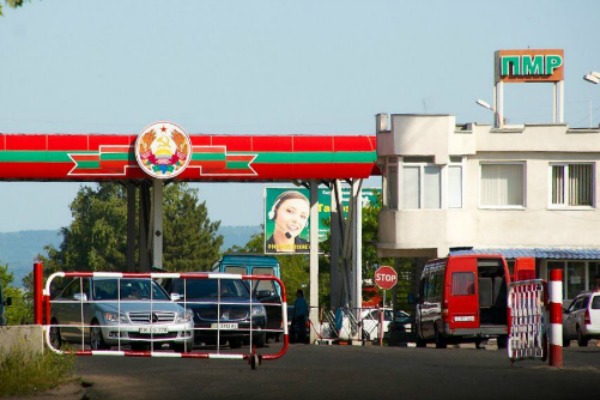
De-Sovereignization: Testing a Conflict-Resolution Model at Moldova’s Expense in Transnistria (Part One)
Publication: Eurasia Daily Monitor Volume: 15 Issue: 132
By:

The Organization for Security and Cooperation in Europe (OSCE) has functioned under Russia-friendly chairmanships in the last three years: Germany (2016), Austria (2017) and Italy (2018). The heavyweight German chairmanship, under then–minister of foreign affairs Frank-Walter Steinmeier (now head of state), launched a Moldova-Transnistria experiment that the Italian chairmanship is accelerating this year under its special representative, Franco Frattini. Twice minister of foreign affairs, Frattini is a colleague of former prime minister Silvio Berlusconi and—like the latter—outspokenly Kremlin-friendly.
This experiment consists of “resolving” the Transnistria conflict piecemeal, through a series of “small steps” of a practical, ostensibly non-political nature, but with legal consequences and international implications (see below). These small steps threaten to erode Moldova’s titular sovereignty in Transnistria, correspondingly endow Transnistria’s authorities with elements of quasi-sovereignty, and cumulatively lead toward a negotiated, internationally-approved “special status” for Transnistria.
Russia originated the “special status” concept in the OSCE long ago, specifically for Transnistria; and it pursues this objective currently on parallel tracks for Transnistria and the Russian-controlled territory in Ukraine’s east. Any advance toward a special status for Transnistria—including the current small steps—will, if completed, be invoked by Russia and even by some European governments as potential precedents to a similar process in Ukraine’s east. Frattini personally is on record as supporting Ukraine’s “federalization,” but this is not the name of the game at the OSCE. There, the name of the game is “small steps” toward a “special status” for Transnistria, as a possible model for conflict-resolution elsewhere. This could then directly affect neighboring Ukraine.
The ongoing small-steps process involves, in effect, a gradual transfer of sovereign prerogatives from Moldova’s central government to Transnistria’s authorities. As such, it amounts in practice to a de-sovereignization of Moldova by cumulative effect. This ongoing de-sovereignization, while undeclared, is quasi-legitimized by international sponsorship through the OSCE.
This undertaking is the second of this type in recent years. The first target was Ukraine in Donbas, likely to be targeted again if Moldova’s de-sovereignization is successful in Transnistria. The political clauses of the Minsk armistice documents are the first project of this type, bold and unvarnished in the attempt to de-sovereignize Ukraine in its Russian-controlled territory. Compared with this, the negotiations on Moldova-Transnistria represent the gradualist version of experimenting with a new model of post-Soviet conflict-resolution: de-sovereignizing the titular state in favor of a special status for the Russian-controlled territory.
Admittedly, Moldova’s sovereignty is currently a titular one in Transnistria, not exercised de facto; but Moldova’s title (like Ukraine’s) enjoys international legal recognition. Ukraine’s government and parliament have built strong safeguards against the implementation of this model, and the United States stands on Kyiv’s side (see EDM, September 13). Moldova’s de facto ruler, Vladimir Plahotniuc, however, is going along with this process; and US diplomats—still acting apparently under left-over instructions from the Barack Obama administration—are unnecessarily prodding Plahotniuc’s government to go along.
De-sovereignization operates, in Moldova’s case, by transferring some prerogatives of sovereignty to Transnistria, in piecemeal doses. This process is ongoing without any serious Western or Moldovan push for the withdrawal of Russia’s troops from this part of Moldova and for demobilization of the Transnistrian-flagged, Russian-led army.
The starting premise—that this conflict is local, between two parts of Moldova—is still the old pretense that conceals the conflict’s inter-state nature, Russia against Moldova. The local-conflict cover, accepted by Western diplomacy, allows Russia to participate as a “mediator” in all the “conflict-resolution” negotiations, including the current, small-steps process. Russia, however, prefers to “lead from behind,” letting the OSCE and this organization’s Chisinau mission (US-headed until this month) to ride in front of this process, just as it did during the 2002–2005 “federalization” attempt.
The current process has emboldened Russia to advance its own policy of de-sovereignizing Moldova in Transnistria. This unilateral Russian policy is proceeding in parallel with the multilateral, OSCE-led diplomatic process. Russia traditionally works both unilaterally and multilaterally at the same time in conflict-resolution diplomacy, driving its own policy and manipulating the multilateral frameworks simultaneously. The Kremlin professes to respect Moldova’s territorial integrity and sovereignty in a theoretical way, laced, however, with major preconditions.
In line with this approach, Russia unilaterally conducted its own elections in Transnistria twice this year: the presidential election in March (Vladimir Putin was credited with 96 percent of the votes cast in Transnistria, higher even than Putin’s scores in Abkhazia, South Ossetia and Crimea) and by-elections for two seats in Russia’s Duma, won by the governing United Russia party’s candidates in September in Transnistria (Cikpmr.com, accessed September 17; see EDM, September 18).
Russia staged these elections in Transnistria without the Moldovan government’s consent, dealing with Transnistria’s authorities directly, as if Moldova’s sovereignty no longer applies there (not even in the theoretical sense that Russia professes to respect). Moldova’s government (micro-managed by Plahotniuc) kept its mouth closed and Western diplomats kept their eyes shut when visiting Tiraspol on September 10, the day when those “election” results were announced there.
The OSCE’s, Russian, US, and EU ambassadors to Moldova were visiting Tiraspol on that date for a joint celebration of what they deem the first success in the “small-steps” process: introduction of “neutral” licenses plates and car registration documents, instead of Moldovan plates and documents, for Transnistrian vehicles to travel in Europe (see EDM, July 23, September 18). Significantly, the ambassador of Ukraine (see above) did not join that festivity.
Those ambassadors participate in the 5+2 negotiation format, which oversees the “small-steps” process, one level above the OSCE-Moldova-Transnistria negotiations. In recent months, those ambassadors have pressured the disoriented Chisinau into a series of “small-step” concessions to Tiraspol. These unilateral concessions, achieved in the areas of transportation, education and property legislation, and under discussion in other areas, are cumulatively eroding Moldova’s formally recognized sovereignty in Transnistria (see Part Two).



